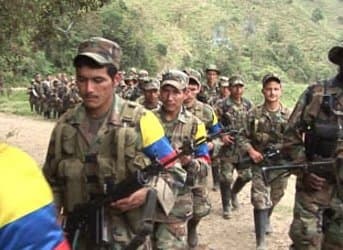Nowhere else in the world is the disparity between rich and poor so extreme as in Latin America.
Beginning in the late 1950s with the triumph of Fidel Castro’s revolution in Cuba, Central and Latin America have simmered ever since with various ongoing militant struggles against fiscal and social injustice.
The best known of these is Colombia’s Marxist Fuerzas Armadas Revolucionarias de Colombia, more commonly known by the acronym FARC.
Colombia has Latin America’s fourth largest economy, but the distribution of wealth is highly unequal, with a 2006 report by the National University of Colombia reporting that only 13.8 percent of total national income is allocated to the poorest 50 percent of the population, while the wealthiest 10 percent of the population benefit from 46.5 percent.
FARC was founded in 1964 and represents the Western hemisphere's longest-running guerrilla movement. FARC specializes in oil infrastructure attacks, particularly the 500 mile-long 100,000 barrel per day Cano Limon-Coveñas pipeline, the most heavily attacked oil infrastructure in the world. In 2001, the pipeline was attacked 170 times. A decade later, by the first half of 2012, state-owned oil company Ecopetrol pipelines and production facilities were attacked a total of 67 times, with Cano Limon-Coveñas having been attacked so frequently that locals call it "la flauta" (the flute) because of the perforations punched in it by guerrillas.
Related article: Finding Good Investments in Areas with Growing Oil Production
Last month alone there were two attacks on Cano Limon-Coveñas pipeline in Arauco Department, on 6 and 21 March. The first attack occurred at the pipeline’s Kilometer 9 in rural Las Pavas and caused a large-scale fire. As for the second assault, Felix Ortiz, deputy commander of the Army's 18th Brigade said, "There was an attack on the Cano Limon pipeline at Kilometer 59 in the Porvenir sector in Arauquita, there was oil spill and they caused lot of damage." According to Colombia’s Finance Minister Mauricio Cardenas, oil infrastructure security has improved since September 2012, with more than 20,000 troops now protecting oil infrastructure across the country.
Political analysts have noted that oil rich Latin American countries that have implemented genuine social reform to aid the poor, such as Venezuela and Brazil, have not seen their energy infrastructures subjected to such assaults.
But worse may be coming for Colombia, as FARC has announced its intention to join forces with the leftist Ejército de Liberación Nacional (ELN). A press announcement posted on FARC’s website on 31 March after praising the new cooperation between the two groups stated that the unity was necessary “to resolutely confront the big oligopolies, transnational capital and imperialism… Finally, the present political situation in Arauca Department and eastern Colombia forces us all to consider the economic and social situation created by the presence of multinational companies and the unbridled ambitions and voracious appetites of the mining and energy sectors, which have caused the current massive militarization, which impacts the environment and disrupts the region’s tranquility.”
Last but not least, a further example of the two groups’ evolving strategy to combat the “big oligopolies, transnational capital and imperialism” is seen in recent pronouncement on its captive, Canadian citizen Jernoc Wobert. Wobert, a 47-year-old geologist, was working for the Toronto -based Braeval Mining Corp. BVL as vice president of exploration, when he was abducted from a gold mining camp in Casa de Barro, Norosí, on 18 January. Since then several attempts by Colombia’s armed forces to liberate him have been unsuccessful.
Related article: COLOMBIA: Two New Oil Discoveries and Investor Incentives in the Works
The ELN subsequently issued Communication Number 5, “A military rescue attempt for the Canadian is ill-advised” on 8 April which stated, “the multinational mining company Braeval, based in Toronto, Canada, should seek a non-military solution to the detention of its vice president of exploration, Wobert. A sign of its willingness to negotiate would be the return of the mining titles that it swindled from the traditional mining communities of Mina Seca (1526.91 hectares), La Nevera (880.32 hectares), Casa de Barro (200 hectares) and Las Nieves (36 hectares)."
Three Colombians and two Peruvians kidnapped along with Wobert were handed over to the International Committee of the Red Cross on 16 February.
The ELN guerrillas and the campesinos may have a point about being swindled out of their land. Transparency International’s “2012 Corruption Perceptions Index” lists Colombia at #94 out of 174 nations, bracketed by Benin and Djibouti.
ADVERTISEMENT
In any case, the ELN demands set a precedent, which three months of military, paramilitary and police operations directed by the administration of Colombian President Juan Manuel Santos have failed to resolve. If the ELN succeeds in its demands, then one might reasonably expect similar incidents throughout Latin American nations that have pursued similar policies.
Should be interesting to watch.
By. John C.K. Daly of Oilprice.com


















